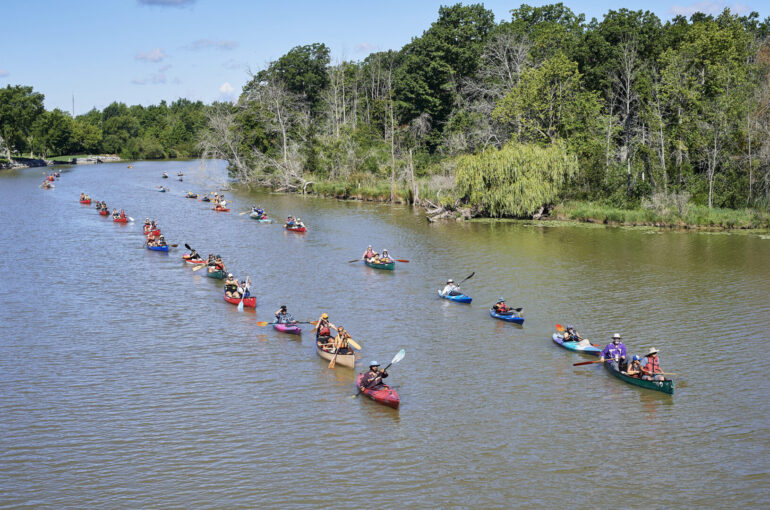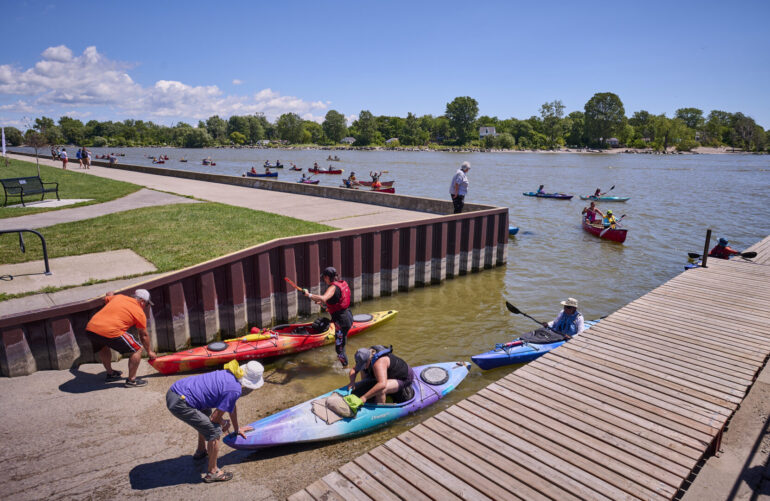For the past eight summers, a group of Indigenous and ally paddlers have launched canoes and kayaks onto the Grand River near Cambridge, Ont., embarking on a multi-day paddling trip in July that ends on Lake Erie near Port Maitland, Ont.
The event isn’t your average gathering of paddling enthusiasts. Known as Two Row on the Grand, the paddle is performed in recognition of the Two Row Wampum, a treaty enacted between the Haudenosaunee and the Dutch in 1613 on Turtle Island (North America).
“The Two Row Wampum is a more than 400-year-old treaty, and it’s based on peace, friendship, and respect,” says Ellie Joseph, a member of the Mohawk people who was born and raised on the Six Nations reserve near Brantford, Ont.
The Two Row Wampum was the first non-paper treaty between Indigenous peoples and European settlers, and it was used to inform later treaties between Indigenous peoples and other colonizers. To solidify the Two Row Wampum, the Haudenosaunee created a belt of white beads with two purple lines running parallel to one another. The white beads represented the water, and the two lines of purple beads represented Dutch ships and Haudenosaunee canoes, travelling together. It symbolized that both peoples would be considered equal, respecting each other’s laws, values, and cultures, without interfering in one another’s lives.
But as time unfolded, the treaty faded into history—until 2013, when members of the six Haudenosaunee nations along with a non-Indigenous ally group known as Neighbors of the Onondaga Nation, organized the Two Row Wampum Renewal Campaign to bring awareness to the treaty. The renewal campaign featured over 200 Indigenous and non-Indigenous paddlers, traversing 225 kilometres of the Hudson River in New York from Albany to New York City.
Ellie Joseph was one of the paddlers on this trip along with Jay Bailey, a Canadian of Dutch descent, who she’d met while working at the Aka:we Canoe Club. Both left the renewal campaign inspired.
“We paddled in two rows down the Hudson River with the Indigenous side and the ally side, helping each other, supporting each other, sharing meals, camping together, and, in the evenings, listening to community cultural gatherings,” Ellie says. “We came away from that so transformed, physically, mentally, emotionally, and spiritually. And we thought, why can’t we do this?”
 Photo courtesy Jay Bailey
Photo courtesy Jay Bailey
It took a few years of organizing, but in the summer of 2016, Ellie, Jay, and two other paddlers launched their crafts onto the Grand River, embarking on a 10-day paddle from Cambridge to Port Maitland. At the end of the trip, the four paddlers sat in a circle sharing their insights from the experience.
“I don’t recall who said it out loud, but we turned to each other, and we were both thinking, how can we not do this again given the life-changing nature of the whole thing,” Jay says. “I’ve always wanted to show my support for Indigenous people, but I never knew how, so this has been a real help.”
Ellie and Jay performed the paddle again the next summer, and the next summer after that—each year the number of participants growing through word of mouth. Eventually, the group swelled to 100, all paddling down the Grand in two lines. But Ellie and Jay have since capped the number of paddlers at 75.
“With more than 100 people, it would lack community and intimacy. We get too large of a group, and people can hide in the group. There may not be much connection.” Ellie says. “Having a smaller group really helps to nurture that community spirit.”
The paddle takes a total of 10 days. Participants can either join for the first five days, the last five days, or the full 10. Depending on the day’s segment, participants can paddle anywhere from 10 to 22 kilometres, occasionally having to portage around dams. The group takes lunch breaks but ends up paddling about three hours each day.
In the evenings, the group sets up tents at campsites, shares meals, and engages in educational seminars. “The majority of our speakers are what we call traditional knowledge keepers,” Ellie says. “They come from our community, and we have many different topics, sometimes talking about the environment, sometimes they’re uncovering our history. We’ve had survivors from the Mohawk Institute that have come and spoken with us about their trauma from residential schools. We do try to balance all of these heavy topics out. Sometimes, someone will come and perform some of our social songs, and we get people up and dancing and moving around and experimenting with our instruments. We’ve also had lacrosse demonstrations, giving people an opportunity to play. It really varies from year to year.”
Jay adds that they also invite non-Indigenous speakers to their evening sessions who cover topics, such as water health on the Grand River and land issues.
 Photo courtesy Jay Bailey
Photo courtesy Jay Bailey
The entire 10-day trip involves a lot of moving parts, and both Ellie and Jay are still in awe of the support they’ve received from paddlers and the surrounding communities. In particular, Ellie says she’s so thankful to her Six Nations community. Not only do they provide financial support but also volunteers to lend a hand.
“One of the things I find fascinating is that the people who come on the Two Row from Six Nations, I don’t see anger for the past, what I see is a desire to repair the relationship,” Jay says. “I’ve seen the original Two Row Wampum on display at Six Nations, and it’s badly in need of repair. There are beads missing, there are parts coming off. And I understand that it will be repaired once the relationship between Indigenous peoples and settlers is repaired. It reflects the condition of that relationship.”

Need more news?
Find your cottage state of mind all year round with our weekly newsletter, Dockside
Sign up hereRelated Story Ancient Indigenous pictographs vandalized at Bon Echo Provincial Park
Related Story 9 painted SUPs that will have you yearning for the water
Related Story Long read: the pleasure of canoeing in the off-season